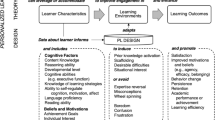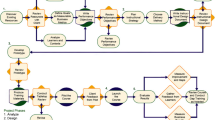Abstract
The expectations within higher education to improve online STEM courses have continued to increase. The pressure to do so particularly pertains to the lower-level introductory courses that act as gatekeeping courses to various STEM-related majors. Rather than working alone to improve their courses, more instructors for these courses pair with the respective instructional designers at their institutions to refresh or revise, their online courses. This study examines the revisions of a two-part introduction-to-biology series of online courses with their respective online labs over the span of three years, and from a sampling of 905 students, compares the final scores from the courses and the labs between each iteration. Findings indicate that multiple iterations of a course have the potential to increase student outcomes and to decrease the student dropout rate over time. Additionally, purely online students can perform differently in response to course revisions in comparison to the online students who also enroll in non-online courses, implying that the needs of online-only students may differ from those who have a blended learning experience.

Similar content being viewed by others
Data Availability
The data that support the findings of this study are available on request from the corresponding author. The data are not publicly available due to privacy or ethical restrictions.
Change history
15 January 2024
A Correction to this paper has been published: https://doi.org/10.1007/s10763-024-10442-w
References
Bathke, A. (2002). ANOVA for a large number of treatments. Mathematical Methods of Statistics, 11(1), 118–132.
Bathke, A. (2004). The ANOVA F test can still be used in some balanced designs with unequal variances and nonnormal data. Journal of Statistical Planning and Inference, 126(2), 413–422.
Biel, R., & Brame, C. J. (2016). Traditional versus online biology courses: Connecting course design and student learning in an online setting. Journal of Microbiology & Biology Education, 17(3), 417–422. https://doi.org/10.1128/jmbe.v17i3.1157
Blanca, M. J., Arnau, J., Garcia-Castro, F. J., Alarcon, R., & Bono, R. (2023). Non-normal data in repeated measures ANOVA: Impact on type I error and power. Psicothema, 35(1), 21–29. https://doi.org/10.7334/psicothema2022.292
Brewer, C. A., & Smith, D. (2011). Vision and change in undergraduate biology education: A call to action. American Association for the Advancement of Science.https://visionandchange.org/wp-content/uploads/2011/03/Revised-Vision-and-Change-Final-Report.pdf
Brom, C., Starkova, T., & D’Mello, S. K. (2018). How effective is emotional design? A meta-analysis on facial anthropomorphisms and pleasant colors during multimedia learning. Educational Research Review, 25, 100–119. https://doi.org/10.1016/j.edurev.2018.09.004
Cohen, J. (1988). Statistical power analysis for the behavioral sciences (2nd ed.). Lawrence Erlbaum Associates.
Clemmons, A. W., Timbrook, J., Herron, J. C., & Crowe, A. J. (2020). BioSkills Guide development and national validation of a tool for interpreting the vission and change core competencies. CBE Life Science Education, 19(4), 53. https://doi.org/10.1187/cbe.19-11-0259
de Jong, T., Sotiriou, S., & Gillet, D. (2014). Innovations in STEM education: The Go-Lab federation of online labs. Smart Learning Environments, 1(1), 1–16. https://doi.org/10.1186/s40561-014-0003-6
Fiore, L., & Ratti, G. (2007). Remote laboratory and animal behaviour: An interactive open field system. Computers & Education, 49(4), 1299–1307.
Garman, D. E. (2012). Student success in face-to-face and online sections of biology courses at a community college in East Tennessee [Doctoral dissertation]. East Tennessee State University.
Harris, B. N., McCarthy, P. C., Wright, A. M., Schutz, H., Boersma, K. S., Shepherd, S. L., Manning, L. A., Malisch, J. L., & Ellington, R. M. (2020). From panic to pedagogy: Using online active learning to promote inclusive instruction in ecology and evolutionary biology courses and beyond. Ecology and Evolution, 10(22), 12581–12612. https://doi.org/10.1002/ece3.6915
Hochberg, Y., & Tamhane, A. C. (1987). Multiple comparison procedures. John Wiley & Sons Inc.
Hollowell, G. P., Brooks, R. M., & Anderson, Y. B. (2017). Course design, quality matters training, and student outcomes. American Journal of Distance Education, 31(3), 207–216.
Hossain, Z., Bumbacher, E., Brauneis, A., Diaz, M., Saltarelli, A., Blikstein, P., & Riedel-Kruse, I. H. (2018). Design guidelines and empirical case study for scaling authentic inquiry-based science learning via open online courses and interactive biology cloud labs. International Journal of Artificial Intelligence in Education, 28(4), 478–507. https://doi.org/10.1080/08923647.2017.1301144
Kapici, H. O., Akcay, H., & Koca, E. E. (2022). Comparison of the quality of written scientific arguments in different laboratory environments. International Journal of Science and Mathematics Education, 20(1), 69–88.
Khalil, M. K., & Elkhider, I. A. (2016). Applying learning theories and instructional design models for effective instruction. Advances in Physiology Education, 40(2), 147–156.
Lantz, B. (2013). The impact of sample non-normality on ANOVA and alternative methods. British Journal of Mathematical and Statistical Psychology, 66(2), 224–244.
Lopes, B., Moreira, A. C., & Pedrosa-de-Jesus, M. H. (2012). Questions in biology: Designing an online discussion forum for promoting active learning about evolution. In F. J. Gonçalves, R. Pereira, W. L. Filho, & U. M. Azeiteiro (Eds.), Science and environmental education: Towards the integration of science education, experimental science activities and environmental education (pp. 235-254). Peter Lang Verlag.
Means, B., Toyama, Y., Murphy, R., & Baki, M. (2013). The effectiveness of online and blended learning: A meta-analysis of the empirical literature. Teachers College Record, 115(3), 1–47.
Nischal, S., Zulema Cabail, M., & Poon, K. (2022). Combining virtual simulations with take-home projects as a replacement for face-to-face labs in introductory biology laboratory courses. Journal of Biological Education, 1–14. https://doi.org/10.1080/00219266.2022.2147206
Palloff, R. M., & Pratt, K. (2013). Lessons from the virtual classroom: The realities of online teaching. Wiley.
Ray, S., & Srivastava, S. (2020). Virtualization of science education: A lesson from the COVID-19 pandemic. Journal of Proteins and Proteomics, 11, 77–80.
Rissanen, A., & Costello, J. M. (2023). The effectiveness of interactive online tutorials in first-year large biology course. Journal of Applied Research in Higher Education., 15(3), 632–649. https://doi.org/10.1108/JARHE-09-2020-0312
Shingala, M. C., & Rajyaguru, A. (2015). Comparison of post hoc tests for unequal variance. International Journal of New Technologies in Science and Engineering, 2(5), 22–33.
Smith, J. J., Johnson, W. R., Lark, A. M., Mead, L. S., Wiser, M. J., & Pennock, R. T. (2016). An Avida-ED digital evolution curriculum for undergraduate biology. Evolution: Education and Outreach, 9(1), 1–11. https://doi.org/10.1186/s12052-016-0060-0
Tho, S. W., Yeung, Y. Y., Wei, R., Chan, K. W., & So, W. W. M. (2017). A systematic review of remote laboratory work in science education with the support of visualizing its structure through the HistCite and CiteSpace software. International Journal of Science and Mathematics Education, 15(7), 1217–1236.
Van Dyke, A. R., Gatazka, D. H., & Hanania, M. M. (2018). Innovations in undergraduate chemical biology education. ACS Chemical Biology, 13(1), 26–35. https://doi.org/10.1021/acschembio.7b00986
Wright, L. K., Newman, D. L., Cardinale, J. A., & Teese, R. (2016). Web-based interactive video vignettes create a personalized active learning classroom for introducing big ideas in introductory biology. Bioscene: Journal of College Biology Teaching, 42(2), 32–43.
Zyto, S., Karger, D., Ackerman, M., & Mahajan, S. (2012). Successful classroom deployment of a social document annotation system. In J. A. Konstan, E. H. Chi, & K. Höök (Eds.), Proceedings of the SIGCHI Conference on Human Factors in Computing Systems (pp. 1883–1892). Association for Computing Machinery. https://doi.org/10.1145/2207676.2208326
Acknowledgements
The researchers would like to thank Dr. Megan Podsiad, Rachel Seaman, Kellie Mcdonald, and Joleen Cannon for their contributions and support during the research.
Author information
Authors and Affiliations
Contributions
All authors have sufficiently contributed to the study and agreed with the results and conclusions.
Corresponding author
Ethics declarations
Ethical Approval
This study was performed with permission from the researchers’ Institutional Review Board.
Conflict of Interest
Dr. Stefanie Gazda declares no competing interests. Dr. Brenda Such is an instructor at the University of Florida College of Education and is an associate director for the Center for Online Innovation and Production, which focuses on instructional design work.
Additional information
The original version of this article was revised: The original version of this article unfortunately contained misspelled author name in the Acknowledgment section as Kellie McDonald
Rights and permissions
Springer Nature or its licensor (e.g. a society or other partner) holds exclusive rights to this article under a publishing agreement with the author(s) or other rightsholder(s); author self-archiving of the accepted manuscript version of this article is solely governed by the terms of such publishing agreement and applicable law.
About this article
Cite this article
Such, B., Gazda, S. The Influence of Iterative Online Course Designs on Student Learning Outcomes in Large Undergraduate Biology Courses and Labs. Int J of Sci and Math Educ (2023). https://doi.org/10.1007/s10763-023-10429-z
Received:
Accepted:
Published:
DOI: https://doi.org/10.1007/s10763-023-10429-z




